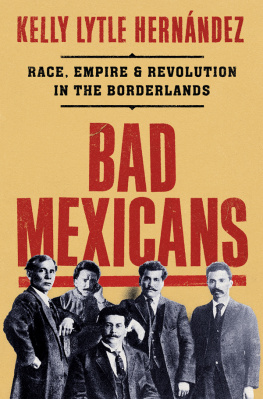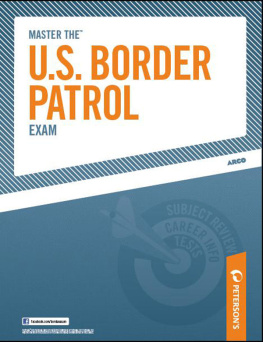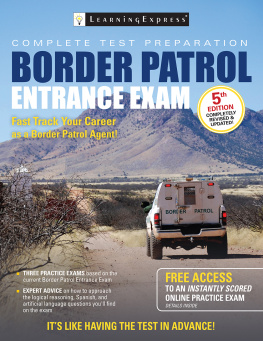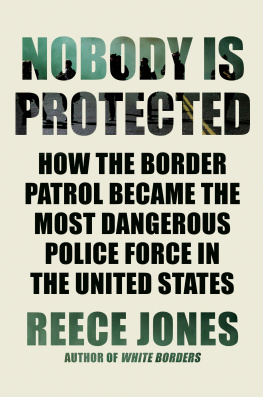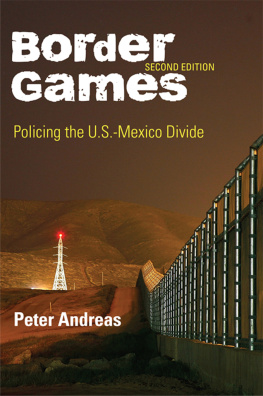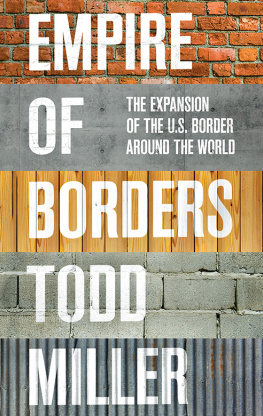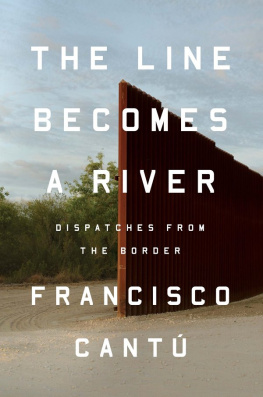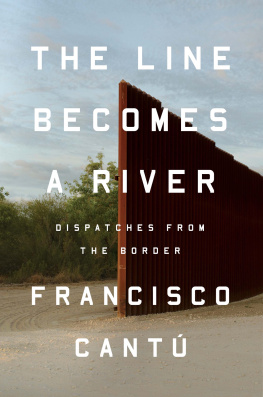The publisher gratefully acknowledges the generous
support of the Humanities Endowment Fund of the
University of California Press Foundation.
Migra!
AMERICAN CROSSROADS
Edited by Earl Lewis, George Lipsitz, Peggy Pascoe, George Snchez, and Dana Takagi
Migra!
A History of the U.S. Border Patrol
_____
Kelly Lytle Hernndez

University of California Press, one of the most distinguished university presses in the United States, enriches lives around the world by advancing scholarship in the humanities, social sciences, and natural sciences. Its activities are supported by the UC Press Foundation and by philanthropic contributions from individuals and institutions. For more information, visit www.ucpress.edu .
Superman Es Ilegal, by Jorge Lerma, Copyright 1979 by Peer International Corporation. International Copyright secured. Used by permission. All rights reserved. Translation by Alex and Nina Hidalgo, in Larry R. Juchartz, Elizabeth A. Stolarek, and Christy Rishoi, eds., American Dreams (New York: Pearson Longman, 2009), 22729.
Epigraph photo: Superman and Friends: A Mexican immigrant awaits deportation, circa 1953. U.S. Border Patrol (McAllen, Texas) Official Photograph, File No. 487. Courtesy of the National Border Patrol MuseumEl Paso, Texas.
A version of appeared earlier and is reprinted with permission of The Regents of the University of California from Aztln: A Journal of Chicano Studies 34 (Spring 2009), UCLA Chicano Studies Research Center. Not for further reproduction. Versions of chapters 6 and 8 appeared earlier, copyright by the Western History Association. Reprinted by permission. The article first appeared as The Crimes and Consequences of Illegal Immigration: A Cross-Border Examination of Operation Wetback, 19431954, Western Historical Quarterly 7 (Winter 2006): 42144.
University of California Press
Berkeley and Los Angeles, California
University of California Press, Ltd.
London, England
2010 by The Regents of the University of California
Library of Congress Cataloging-in-Publication Data
Hernandez, Kelly Lytle.
Migra! : a history of the U.S. Border Patrol / Kelly Lytle Hernandez.
p. cm. (American crossroads ; 29)
Includes bibliographical references and index.
ISBN 978-0-520-25769-6 (cloth : alk. paper) ISBN 978-0-520-26641-4 (pbk. : alk. paper)
1. United States. Immigration Border PatrolHistory. 2. Mexican-American Border RegionHistory. 3. Illegal aliensMexican-American Border Region. 4. United StatesEmigration and immigration. I. Title.
JV6483.H45 2010
363.2850973dc22 2009039563
Manufactured in the United States of America
19 18 17 16 15 14 13 12 11 10
10 9 8 7 6 5 4 3 2 1
This book is printed on Cascades Enviro 100, a 100% post consumer waste, recycled, de-inked fiber. FSC recycled certified and processed chlorine free. It is acid free, Ecologo certified, and manufactured by BioGas energy.
For my mother
because you taught me to write
For my father
because you inspire me to take on the world
For my brother
because you teach me that change is possible
For my husband
because you are beautiful
For my children
because I love you

[Spoken] Its a bird!
Its a plane!
No man, its a wetback.
[Sung] He came from the sky, but he is not a plane.
He came in his spaceship from Krypton,
And by the looks of him, hes not American.
Hes someone like meundocumented.
So the migrant should not work
Because even though it hurts, Superman is an illegal.
Hes a journalist, and I am too;
He didnt serve in the army (what a bum!)
He is white, has blue eyes and is well-formed;
Im dark-skinned, chubby, and short.
But in my homeland I already marched
With the coyote I paid when I crossed.
He didnt serve in the military
He doesnt pay taxes and he wants to pass judgment
He doesnt have diamonds or a license to fly.
Ill bet he doesnt even have a social security card.
We need to kick Superman out of here
And if its possible, send him back to Krypton.
Where is the emigration authority?
Whats the news, Mr. Racism, in the nation?
For all I know they dont fine him for flying
But on the contrary, they declare hes Superman.
JORGE LERMA, SUPERMAN IS AN ILLEGAL ALIEN
CONTENTS
ILLUSTRATIONS
FIGURES
TABLES
ACKNOWLEDGMENTS
It was only with the love, support, and generosity of a community of scholars, activists, archivists, friends, and family that I was able to conduct the research and develop the ideas at the heart of this book. To do my best to thank them all, I must start with this books origins in the years that I spent volunteering in the migrant camps of Northern San Diego County. I was just a teenager then, but Reverend Roberto Martnez and Osvaldo Vencor of La Casa de los Hermanos allowed me to participate in their work with undocumented families and laborers living in the canyons. Representing La Casa, I did a little bit of everything. Year after year, Roberto, Osvaldo, the staff of La Casa, and camp residents created space for me to continue contributing in whatever way I could. I thank them for the opportunity that they afforded me to participate in the lives, struggles, and occasional triumphs that were often overlooked as the State of California slid toward the passage of Proposition 187 in November of 1994.
As I worked in the camps, I took courses from George Lipsitz at the University of CaliforniaSan Diego. George made me want to be a scholar, and in the past fifteen years I have looked to him as a model of intellectual excellence and dexterity matched by a deep reservoir of personal commitment to the pursuit of a life better lived and a world better made. George asked all the right questions, he allowed me to stumble, and he always pushed me to do just a little bit better because the inquiries at the heart of our work demand and deserve it. Thank you, George.
As a graduate student, I had the pleasure to work with Eric Monkkonen. It was Erics passion for cop history that pushed me to see the Border Patrol from a new perspective, to search in unexpected places for evidence of the past, and to test new methods. And it was Erics incredible sense of humor that made me look forward to a life in academia.
This project never would have left the ground without Marian L. Smith, the historian of the Immigration and Customs Enforcement Service. Marian brokered a rare collaborative agreement between what was then Immigration and Naturalization Service (INS) Historical Reference Library, the National Archives and Records Administration, and myself, by which I assisted with an ongoing indexing project of all INS files held at NARA. I thank David Brown and Cynthia Fox, who were overseeing the INS indexing project, for graciously allowing me to work in the stacks. The opportunity to participate in an indexing project was an invaluable experience. All of the staff and archivists of NARA were helpful during my summer at the archives, but I worked most closely with Suzanne Harris. Like Marian, Suzanne had an extraordinary knowledge of Record Group 85; her assistance was invaluable, and her generous guidance was a constant support.
Another crucial resource for this book was the National Border Patrol Museum (NBPM). The NBPM staff was kind, open, and supportive upon learning that I was writing a history of the U.S. Border Patrol. I thank Brenda Tisdale and Kristi Rasura, in particular, for all of their assistance and conversation. I thank Mike Kirkwood, who was then director of the NBPM, for allowing me full and unrestricted access to all of the museums records, photos, and files. I am sure that we tell very different stories of the Border Patrols past, but the staff of the NBPM exemplified a level of openness and transparency that is uncommon for a police historical society. Also I thank the many Border Patrol officers with whom I spoke during my trips to INS Headquarters in Washington, D.C., the NBPM, and the Public Information Officers who have taken me on tours of the U.S.-Mexico border in Texas and California. Gus de la Via and Bill Carter took time out of their busy schedules to sit down and share their thoughts with me about the history of the U.S. Border Patrol and their experiences as Border Patrol officers and administrators.
Next page

